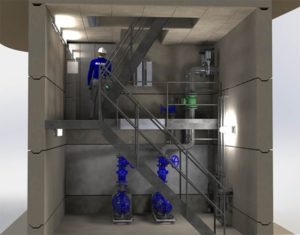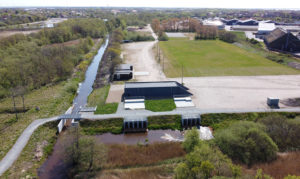Twenty One Bredel Hose Pumps Installed in Landmark Sustainable Energy Project
Bredel hose pumps from Watson-Marlow Fluid Technology Group (WMFTG) have been installed as part of a landmark abrasives handling project at the combined heat and power (CHP) plant of Dong Energy in Studstrup, Denmark.
The project has seen the facility switch from coal to biomass fuel in line with its ambition to supply sustainable energy. Bredel peristaltic hose pumps were selected by the lead contractor, Eurocon, after trials demonstrated how specific challenges such as high density, inhomogeneous mass, abrasive particles and high pressure, could be overcome in a superior manner to competing progressive cavity pumps. Along with sustainability, the success of the project highlights the close co-operation between WMFTG, Dong Energy and Eurocon to establish pipe runs and drops, running speeds, pump specifications and optimum hose life.
Dong Energy’s Studstrup CHP plant is one of the largest in the Denmark. In the summer of 2016, the plant commenced a project that would see it fulfil an ambition to supply green district heating to the nearby city of Aarhus and green electricity to the Danish grid.
Process change
In converting from coal to biomass (wood pellets), Dong Energy required the construction of a plant facility for firing ash from coal combustion to achieve the optimum binding of alkali in the flue gas. This would also serve to spare the boiler walls from scale/slag accumulation, corrosion as well as reduce poisoning of the deNOx catalyst.
For this purpose, fly ash is mixed with 35% water, fed to the dosing tanks (each with a recirculation line) through a 650m-long pipeline and finally injected to the pellet mills. Inside, to avoid settlement, four Bredel 80 hose pumps are deployed to circulate the fly ash slurry, which is then dosed from the recirculation line into a Babcock boiler. The ash slurry is dosed via four wood pellet mills, each mounted with a Bredel 40 pump. In total, the installation involves 21 Bredel pumps of mixed sizes, some of which run continuously.
Before plant construction could commence, a test facility had to be built to determine the viscosity of the ash slurry, as well as measure the pressure drop of the pipes at a given water percentage so that pumps and pipe runs could be dimensioned appropriately,” explains Edo van der Meulen Training & Application Manager at Watson-Marlow Bredel BV in the Netherlands. “From this, we calculated that the mixing plant could be sized to 50m³/h, with the supporting dosing system to feed in at a maximum of 280m³ per day. WMFTG participated fully in the dimensioning of the pumps and with the pressure calculations.”
Extending hose life to enable maximum uptime
It was evident at an early stage in the project that the potential for hose wear was high. Here, project co-operation between WMFTG, Eurocon and Dong Energy saw the delivery of an optimised solution that would potentially result in huge financial savings – fly ash is traditionally handled by large double-acting hydraulic pumps costing circa £500,000 each.
By making subtle changes to the process, it was found that the life of the natural rubber hose elements in use at Dong Energy could be maximised. With good engineering support from WMFTG, the system back pressure versus shimming was optimised, reducing mechanical stress on the pump hoses.
Another adjustment involved line velocity. Here, an initial speed of 20 rpm was set to achieve a line velocity of 2m/s. However, it was discovered that this speed was not necessary to avoid the product settling. Currently the plant is running with 15 rpm (to achieve 1.5m/s), but will soon start testing at 1.2m/s, which will again improve hose life, so increasing process uptime.
The introduction of pulsation dampeners to overcome cavitation further on in the line has also provided a positive change to the pumps installation. As a result of the pulsation dampeners and the reduced flow, system back pressure was decreased to 50%. This has no effect on process speeds as the four Bredel 80 pumps are only circulating fly ash slurry to keep it in suspension.
Optimised solution
“To summarise, the effect of abrasiveness on hose life is low; the effect of factors such as dry solid content and pump speed is much higher,” says Mr van der Meulen. “At Studstrup, the dry solids content of the fly ash entering the system is controlled automatically – when it exceeds the limit at which the slurry can be successfully pumped, a Bredel 40 is activated to add water until the B100 [used to transfer the prepared slurry from a buffer tank to the storage tanks] is able to pump again. As for pump speed, this has an almost linear effect on hose life: half the speed is double the hose life.”
This project is the first time that Eurocon has used peristaltic pumps, but such has been its success that the contractor is now hoping to use the installation at Studstrup as a showcase for future customers. Already, a second installation for Dong Energy is being discussed.







